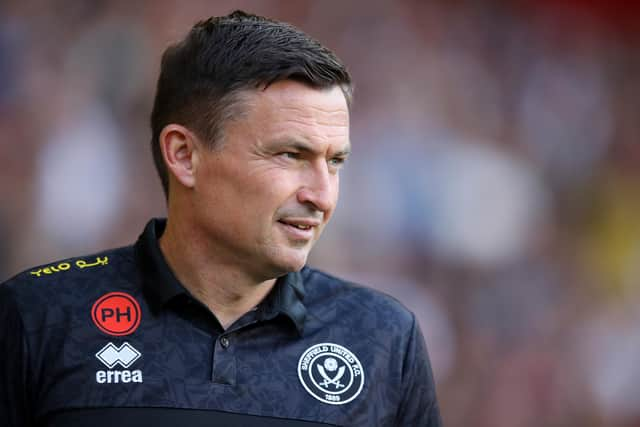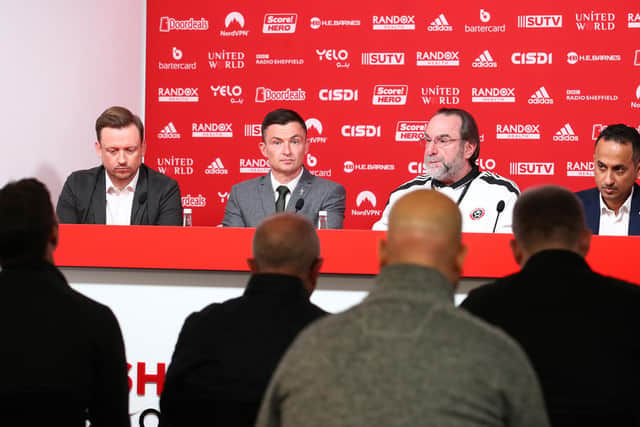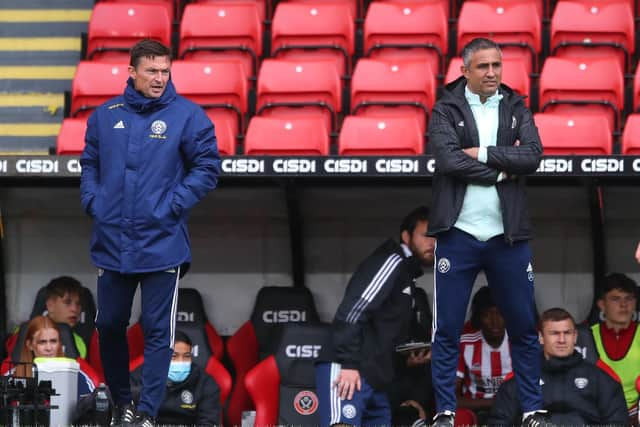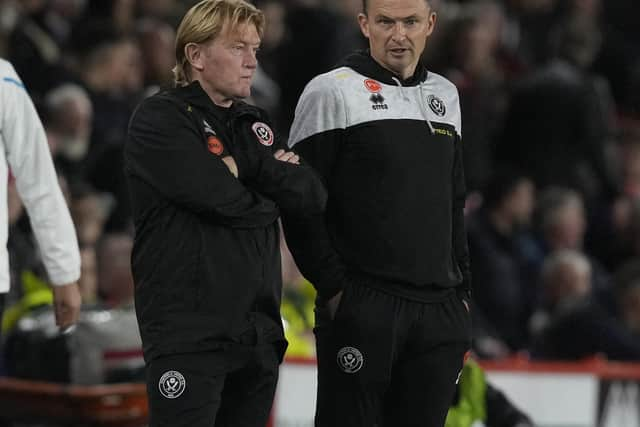Inside Paul Heckingbottom's Sheffield United revolution as boss celebrates a year in charge
and live on Freeview channel 276
The cheap option, said some. A yes man, decided others.
Twelve months on and those suspicions have long been silenced. United have won 26 of Heckingbottom’s 48 league games in permanent charge, a win ratio never bettered in United’s long and illustrious history.
Having inherited a side that was 16th in the Championship and going nowhere quickly, United gatecrashed the play-offs last season and came within a stud’s length of the Wembley final, before losing to eventual promotion winners Nottingham Forest.
Advertisement
Hide AdAdvertisement
Hide AdBut behind the scenes, Heckingbottom and his coaching staff have transformed the culture of a club still reeling from relegation from the Premier League and allowed the Blades to believe again. This is how he did it.
A new strategic direction
Many casual observers were shocked by United’s late-season form which saw them make the play-offs but Heckingbottom and his immediate coaching staff – former Blades players Stuart McCall and Jack Lester – were not amongst them.
After accepting the invitation to try and reshape United’s fortunes, the trio were encouraged by the quality and stature of the squad. Confidence was low, as the relegation hangover and struggle to adapt to Jokanović’s preferred methods took hold. But Heckingbottom and Co. were not prepared to write off the season and impressed that upon the players. They had given their promotion rivals a serious head start, but the race was on.


Many United players knew Heckingbottom from his previous stint as caretaker manager following Chris Wilder’s departure, and were impressed by both his methods and his handling of what was really the ultimate hospital pass. Despite United being beaten and bowed that season, in reality relegated long before the axe officially fell in mid-April, they recovered a little to win three of Heckingbottom’s 10 games in caretaker charge and at least raise some hope that an immediate return could be achieved.
Advertisement
Hide AdAdvertisement
Hide AdAppointing Jokanović was supposed to be a new dawn. Heckingbottom was considered for the role on a permanent basis before returning to his role as U23s boss following the Serb’s appointment. A few months later, he was on the top table at Bramall Lane alongside United’s hierarchy for a hastily-arranged press conference unveiling the club’s new strategic direction.
Amongst the corporate speak, about pillars and leveraging synergies, Heckingbottom reminded those present about the importance of winning football matches and they were not empty words. Three wins on the bounce followed, including the most impressive away at eventual champions Fulham.


Behind the scenes, players responded well to Heckingbottom’s methods. Training changed, from the repetitive drill-based approach of Jokanović and his staff, with McCall and Lester, a former midfielder and striker respectively, designated to work with players in their area of expertise.
Heckingbottom leaned on the ‘outrun, outfight, outplay’ mantra first introduced by Wilder and Co. and looked to impose his own values on United’s squad. Hard work was a given. Respect was expected, too, while bravery was demanded. Ollie Norwood was probably the biggest beneficiary of that, emerging as a key man in Heckingbottom’s system. The manager told him that he would never criticise him for giving the ball away while attempting to make something happen. But hiding, not showing for the ball, would simply not be tolerated.
Advertisement
Hide AdAdvertisement
Hide Ad‘What brings you joy?’


United’s staff were also expected to adhere to the same fundamental principles and as part of that, Heckingbottom introduced a practice of weekly presentations, delivered by players and backroom staff to their fellow teammates, on one simple theme: what brings you joy?
The presentations went down well. Ben Osborn and strength and conditioning coach Lee McMahon spoke about their music passions; Jayden Bogle about his PlayStation. Players who were used to playing in front of tens of thousands cowered at the thought of speaking in front of tens. But the idea brought the group closer together as a group of people, rather than individual players.
United’s players return to the classroom ahead of games for detailed, in-depth analysis on opponents’ strengths and weaknesses – so they know exactly what is expected of them when they step onto the pitch – and the information sometimes comes from players themselves. Billy Sharp and Oli McBurnie prepared a presentation on how the Blades could hurt Birmingham City earlier this season, with McBurnie taking the advice into action by scoring the opener before Troy Deeney levelled.
Heckingbottom is pleasant and genial as a person but isn’t afraid to either tear a strip off a player, or put an arm around the shoulders. Past experiences, at Barnsley and Leeds United and most recently Hibernian in Scotland, have shaped him for the better and taught him to not get too high or low. A single stud in a plastic case reportedly sits on his desk; a reminder of how United came so close to reaching last season’s play-off final, only for Iliman Ndiaye’s effort to hit the stud of Forest goalkeeper Brice Samba and rebound to safety. The fine margins of football.
Advertisement
Hide AdAdvertisement
Hide Ad

He has learned previous lessons around control and is in frequent contact with his board, offering his opinion and experience on footballing matters. Those who label him a ‘yes man’ may be surprised to hear he originally declined to take caretaker charge of United, before eventually accepting after receiving assurances his previous job was secure.
Now, in the top job again, United and Heckingbottom are heading in the right direction again. Further challenges await, with a big possible turnover in the summer and question marks over the future of star men including Sander Berge and Ndiaye. But United went into the World Cup break second in the Championship table and the Blades are believing again. What a difference a year can make.
Comment Guidelines
National World encourages reader discussion on our stories. User feedback, insights and back-and-forth exchanges add a rich layer of context to reporting. Please review our Community Guidelines before commenting.